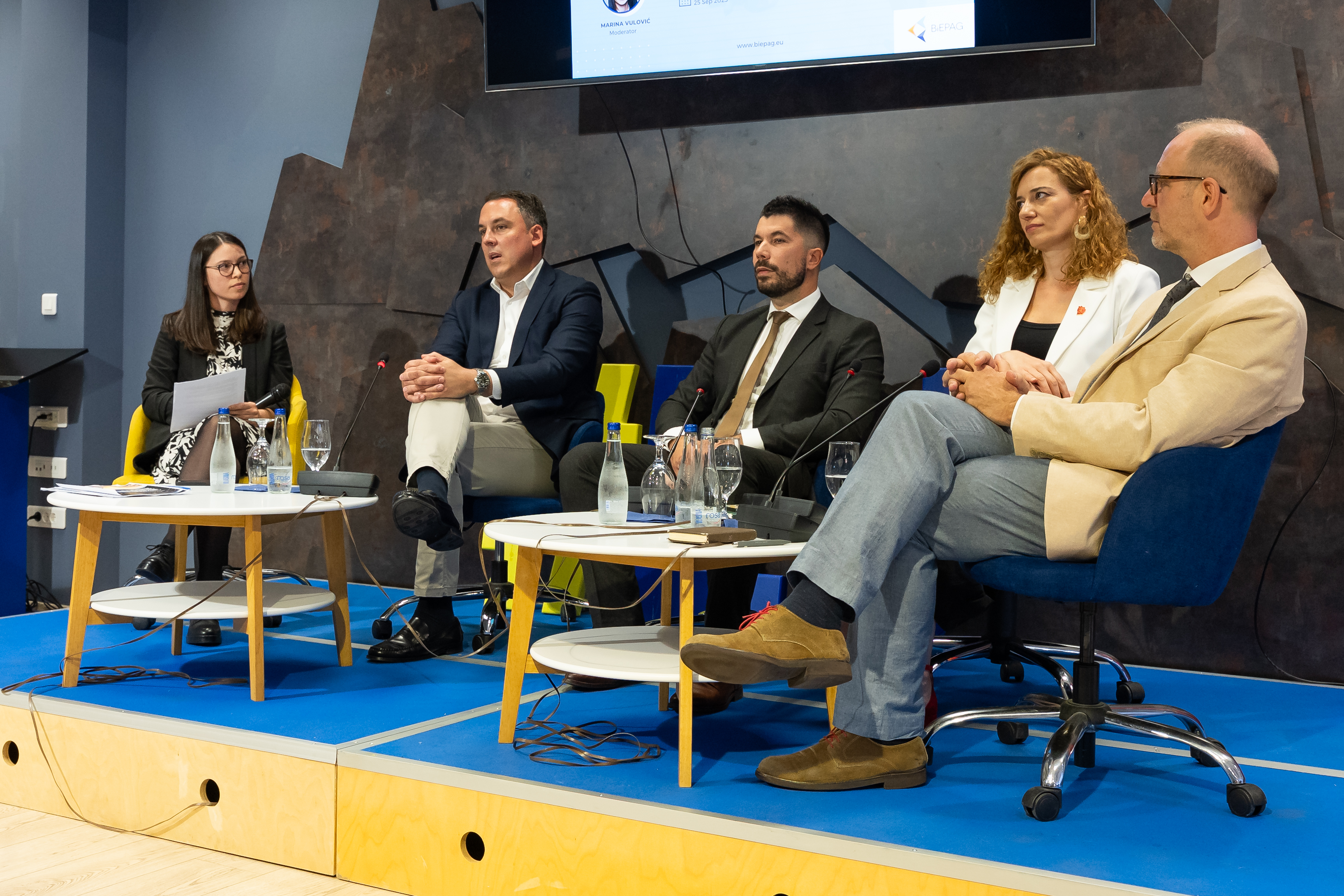
The Balkans in Europe Policy Advisory Group (BiEPAG) organised a panel discussion dedicated to Montenegro’s European path in the broader regional context of the Western Balkans, which was hosted by Europe House Podgorica on Thursday, September 25th.
The event “Montenegro at the Crossroads: Driving EU Integration in the Western Balkans” gathered our BiEPAG members, representatives of the media, diplomatic missions, academia, non-governmental and governmental institutions, as well as the broader public interested in European integration and democratic transformation in the Western Balkans.
The general conclusions were that Montenegro has never had greater support for the European integration process, and the European Union (EU) now views enlargement in a more pragmatic way, which benefits Montenegro. If a referendum on EU membership were held tomorrow, almost no one would vote against it. The EU is viewing enlargement too pragmatically, and that works in Montenegro’s favor.
The MP of the Democratic Party of Socialists and Chair of the Parliamentary Committee on European Integration,Ivan Vuković, said that in the long term, there is no more important issue for Montenegro than EU integration. He stated that everyone in Montenegro, especially those in politics, must focus on this issue, no matter how long it takes to cross that final stretch of the European path.
We are fully aware of what tasks lie ahead for Montenegro, what our domestic obligations look like, and I would be happy if we focused on what needs to be done - without detours that can cause damage or slow down the process.
Florian Bieber, professor at the University of Graz and BiEPAG cooridinator, reflected that Montenegro’s opportunity lies in the geopolitical moment that opened after Russia’s attack on Ukraine. Montenegro needs to seize this opportunity, because it won’t last forever. He noted that this does not mean the process will automatically lead to transformation and strengthened democracy, because the EU is no longer capable-or willing-to support rule of law and democracy in the region.
The key message is that Montenegro should focus its lobbying efforts not in Brussels, but inParis, Berlin, and other capitals of EU member state because Brussels is not where the final decision on Montenegro’s EU membership will be made, but rather in the 27 national parliaments of member states.
BiEPAG member and former Deputy Prime MinisterJovana Marović, said she supports Montenegro joining the EU by2028 or 2029, but that the other side of the issue is determining theminimum criteria Montenegro must fulfill.
Montenegro still faces the same issues and that it’s problematic that the EU praises Montenegro more than the actual state of reforms would warrant. The latest EC report on the rule of law, clearly stated that the retirement of a Constitutional Court judge was unconstitutional - yet a few days later, the EU praised Montenegro as “reforming so quickly, it’s unbelievable.
Marovićemphasized that the EU also has shortcomings in other Western Balkan countries, noting thatNorth Macedonia changed its name and got nothing in return, whiledemocracy in Serbia is eroding, yet President Aleksandar Vučić is still considered a strategic partner.
She added that the EC is far more positive than the member states and suggested that Montenegro should begin working on anaccession treaty, but it must clearly outline what the country needs to do. That treaty could then serve as a model for other Western Balkan countries.
Miloš Radonjić, adviser to the President of Montenegro for European Affairs, said they’ve tried to raise public awareness and explain that European integration is atransformation processof Montenegrin society, through alignment with European standards and practices.
He emphasized thatgood neighbourly relationsare inseparably tied to EU integration, and the core is ensuring peaceful and unobstructed cooperation with neighbouring countries.
We had a test which we failed. We put ourselves in a difficult position by adopting the Resolution on Jasenovac at a time when we should have been speeding up the process. Still from all the latest statements by EU officials, we conclude that the political climate is favorable and that we cannot afford mistakes - this is a unique geopolitical opportunity,” said Radonjić.
The panel discussion was organised as part of the agenda for the BiEPAG semi-annual meeting in Podgorica, which gathered our expert group of prominent public policy researchers from the Western Balkans and across Europe, known for their expertise and understanding of the region and the processes shaping it.